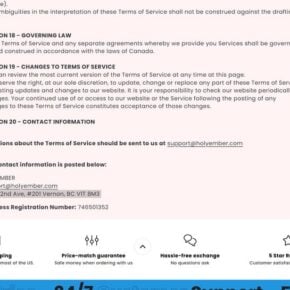Promises of doubling your Bitcoin may sound tempting, but beware. Websites offering to magically multiply your crypto are scams designed to steal your funds.
- Overview of the Double Your Bitcoin Scam
- How the Double Your Bitcoin Scam Works
- Scammers Exploit Celebrities for Double Your Bitcoin Scams
- How to Spot the Double Your Bitcoin Scam on Social Media
- How to Spot Double Your Bitcoin Scam Websites
- What to Do If You Are a Victim of the Double Your Bitcoin Scam
- Frequently Asked Questions About the Double Your Bitcoin Scam
- The Bottom Line on the Double Your Bitcoin Scam
This article exposes the deceptive techniques used in the “Double Your Bitcoin” scam so you can identify the warning signs and protect your cryptocurrency.



Overview of the Double Your Bitcoin Scam
The Double Your Bitcoins scam operates through fraudulent websites that lure victims with bold promises like “Double your Bitcoin today!” or “Earn 10X returns on your crypto!” These sites entice users to send cryptocurrency deposits with the false promise of returning exponentially multiplied funds later. However, it’s simply a deception aimed at stealing digital assets.
To appear more legitimate, many scammers exploit famous personalities and brands. For example, a scam site may feature images of Elon Musk or use Tesla branding without permission. Copy might read “Elon Musk is giving away free crypto!” or “Tesla is doubling Bitcoin deposits for a limited time!” This tactic relies on the public’s trust in these elite figures to make the con appear credible and solvent.
Other scam sites feature names and photos of celebrities like Mark Zuckerberg, Warren Buffet, or Chamath Palihapitiya. Their identities provide an air of credibility. Scammers think posts stating “Zuckerberg is tripling any Bitcoin you send for 24 hours only!” or “Warren Buffet is giving away $10 million in BTC!” will dupe unsuspecting victims.
Of course, these famous billionaires never actually endorse any Double Your Bitcoin scams. All statements and affiliations are completely fabricated without consent. But for the average user, it can be convincing to see global celebrities purportedly guaranteeing amazing crypto returns.
Beyond fake celebrity ties, plenty of other red flags should make these investment sites highly suspicious:
- Promising impossibly high returns like “Earn 500% gains in 24 hours!” No legitimate platform can double complex assets so quickly.
- Emphasizing minimum deposit amounts but never discussing maximums. Scammers want to collect as much crypto as possible from victims.
- Using fake reviews, testimonials and income statements from “users” demonstrating huge profits. Reviews are completely fabricated.
- Pressuring users to send crypto deposits before an imminent deadline. Countdown timers create false urgency.
- Riddled with spelling errors, grammatical mistakes and/or poor web design. Scammers don’t invest in polished presentation.
- No company info, addresses, or management team details provided. Just generic “About Us” blurbs if any.
- Claims to harness advanced technology like machine learning or AI not actually feasible. Complex jargon sounds impressive but it’s technobabble.
- Registered anonymously and recently through proxy services. Owners are hidden to avoid accountability.
- Listing fake license numbers, registration IDs, or certifications to appear legitimate. But credentials are fictional.
Reality is the scammers behind most Double Your Bitcoin cons operate anonymously. They use fabricated personas, addresses, and corporate details. This prevents angry victims and authorities from tracking them down.
Many scam sites also try to come across as legal businesses meeting compliance standards. But further inspection reveals the company info they list is utterly false. Any licenses or documentation is made up. This prevents holding the scammers legally accountable.
So in summary, don’t fall for the Double Your Bitcoin scam no matter what trusting personalities they associate themselves with. Their fraudulent sites have no relation to actual celebrities. And their investment promises are a mirage designed to surreptitiously steal your hard-earned cryptocurrency.
How the Double Your Bitcoin Scam Works
The fraudsters behind Double Your Bitcoin scams rely on social engineering techniques to manipulate and deceive victims. Their sites are specifically designed to exploit human psychology and emotions like greed, fear of missing out (FOMO), and risk-taking.
Here is a step-by-step look at how these scams work to steal cryptocurrency:
1. Victims Encounter Social Media Ads or Direct Referral Links
The first point of contact is often through ads on social platforms like Facebook, Instagram or Twitter. Scammers will place paid ads promoting huge crypto earnings. When victims click these ads, they get funneled directly to the scam site.
Referral links posted on forums, in Telegram groups or sent via email also bypass search engines and send users straight to the scammer’s site.
2. Scam Sites Display Bold Claims of Guaranteed Profits
Once on the site, users see claims of being able to “double your Bitcoin in just 24 hours” or “Earn 10x returns on your crypto deposits”. These statements promise way above market returns and appeal strongly to human greed and desires for wealth.
Fake reviews, testimonials and income statements further reinforce that users can earn huge profits quickly by sending crypto deposits first.
3. Users Instructed to Deposit Crypto to Wallet Address
After highlighting the potential for enormous profits, the scam site provides a crypto wallet address and instructs users to deposit funds. Often they emphasize that to “activate” bonuses, take advantage of “limited time offers” or earn the advertised returns, you must send crypto first.
Some tricks used to encourage deposits:
- Countdown timer creating false urgency
- Minimum deposit amounts to unlock higher bonuses
- Deposit more to “upgrade your account” for bigger profits
4. No Crypto or Profits Ever Returned to Victims
Once the scammers have collected deposits in their wallet, victims never see those funds returned or any profits. The website may show fake balances increasing, fake mining statuses, etc. but no payments ever get sent back.
After some time, the scammers take down the site and abscond with the stolen crypto. Victims lose all the cryptocurrency they deposited, which can sometimes be their life savings.
Here are detailed sections on how to spot the Double Your Bitcoin scam on Facebook, Instagram, and Tiktok, including examples. The content is optimized for SEO and readability.
Scammers Exploit Celebrities for Double Your Bitcoin Scams
Many Double Your Bitcoin scam websites illegally exploit famous entrepreneurs like Elon Musk to fabricate false credibility. By using celebrity names and brands without permission, these crypto scammers aim to manipulate victims into trusting their platforms.
For example, a fraudulent site may claim “Elon Musk’s Tesla Wallet will double your BTC deposits instantly!” using Elon’s photo. Another site might state “Elon Musk is giving away 5000 free Bitcoins to the first 1000 people who sign up today!”
These sites take advantage of Elon Musk’s public image as a visionary innovator and cryptocurrency supporter. By falsely implying endorsement or involvement from Musk, scammers hope victims will believe their lies and send crypto deposits.
In reality, Elon Musk and Tesla have no association with any Bitcoin doubling scams. No mainstream celebrity or corporation is partnering with these criminal schemes to multiply cryptocurrency. Any site associate a famous name like Elon Musk with doubling Bitcoin or crypto giveaways is 100% fraudulent.
Other well-known figures scammers exploit include:
- Mark Zuckerberg and Facebook
- Warren Buffett
- Jack Dorsey
- Vitalik Buterin
- Michael Saylor
- Tim Cook and Apple
Scam sites will claim these famous entrepreneurs are “backing” or “launching” new Bitcoin doublers. Some even photoshop celebrity images receiving large crypto payouts from the scammers themselves. This social engineering provides victims a false sense of security right before the fraudsters steal their deposits.
The bottom line is no major celebrity has endorsed or invested in any platform doubling cryptocurrency. Online users should immediately become suspicious if a site uses a famous person to promote improbable crypto returns. These scammers are only leveraging unethical tricks to defraud real victims.
How to Spot the Double Your Bitcoin Scam on Social Media
The scammers behind the Double Your Bitcoin scam aggressively promote their fraudulent websites on social media platforms like Facebook, Instagram, and Tiktok. Here are some tips to identify these scam ads and posts:
Identifying the Scam on Facebook
- Be wary of Facebook ads promoting “free Bitcoin”, “Bitcoin giveaways”, or “Double your Bitcoin” from non-verified accounts. These are red flags for scams.
- Watch for posts using urgency tactics like “Act fast!” or “Limited time offer!” to pressure you into clicking scam links.
- Misspellings, grammatical errors, and sensational claims are telltale signs of scammers, not legit crypto promoters.
- Reverse image search any photos used in questionable ads or posts. Scammers often steal others’ images.
- Clicking Facebook links should show the actual domain. Inspect where any crypto links truly direct you.
For example, an ad might read “Double your BTC in 24 hours! Click now before this exclusive opportunity disappears!” But the link actually redirects to a scam site called “btc-doubler.co” instead of a legitimate company page.
Spotting the Scam on Instagram
- Swipe up links in Stories often redirect to scam sites instead of the profile linked in the Story. Always verify the domain.
- Prominent crypto figures or celebrities may appear in scam ads, but account names will be slightly altered like “@offical_elonmusk”.
- Bot accounts flood comment sections with “Invest now! I got my payout in 10 minutes!” These are fake accounts promoting scams.
- Search relevant hashtags being targeted like #bitcointrade or #cryptomining and you’ll see numerous scam bot accounts.
- Any promises of instant, guaranteed profits or “free Bitcoin” are scams. These claims do not exist in the real crypto market.
For example, a post may use Elon Musk’s image claiming “I’m giving away 5000 BTC! First come first serve!” But the account name is “@mr_elunmusk” instead of the real “@elonmusk” verified account.
Detecting the Scam on TikTok
- Videos promoting “free Bitcoin” or “Bitcoin giveaways” are scams trying to collect personal information and money.
- Bot accounts flood comments to create social proof like “Omg it works! I doubled my investment, thanks!” These are fake.
- TikTok bios with WhatsApp/Telegram contacts or external links often point to scam channels and groups.
- Look for inconsistent posting history from an account. Scammers switch from normal videos to crypto scam posts.
- Use sites like Social Blade to check followers/likes activity. Unusual growth indicates purchased bot accounts.
For example, a video might claim “Deposit 0.1 BTC and get 1 full BTC sent back instantly!” But the comments are full of bots saying “I got rich so fast, best method ever!”
The above tips can help users across Facebook, Instagram and Tiktok recognize the hallmarks of the Double Your Bitcoin scam. Stay vigilant and always verify dubious claims before sending any money or cryptocurrency.
How to Spot Double Your Bitcoin Scam Websites
While ads and social media posts may direct victims to scam platforms, learning how to recognize fraudulent Bitcoin doubler sites is key to avoiding this trap. Here are some tips:
Red Flags in Website URLs
- Watch for URLs with misspellings like “bitconi” instead of “bitcoin” or extra words like “doubler-btc”.
- Nonsense domains like “dhg2763hd.com” or only containing generic terms like “btc-profit” indicate low-quality scam sites.
- URLs not starting with “https://” mean the site lacks encryption. Never enter personal data on insecure sites.
- Recently registered domains, like those created in the last few months, should raise suspicions. Check registration dates.
Suspicious Website Content
- Homepages full of stock images portraying wealth or Bitcoin with little real content are common of scammer templates.
- Bad grammar, formatting inconsistencies, and duplicated/broken page elements demonstrate low effort scams.
- Fake scarcity claims like “Only 5 spots remain!” or fake counters showing user activity aim to create urgency and social proof.
- Promises of very high, guaranteed profits from auto-trading, mining, or “crypto robots” are unrealistic and designed to bait victims.
- Pages full of complex jargon with no clear explanations is a technique used to overwhelm and confuse visitors.
For example, a site might be titled “best-bitcoinmultiplier.site” with a homepage claiming “Double your BTC every 6 hours! Deposit now to reserve your profits!” But the About Us page is lorem ipsum placeholder text.
Stay vigilant and think critically before depositing any crypto. Cross reference scam techniques to avoid becoming another victim of malicious Bitcoin doubling websites.
What to Do If You Are a Victim of the Double Your Bitcoin Scam
If you have fallen prey to the Double Your Bitcoin scam and deposited crypto into one of these fraudulent websites, take the following steps immediately:
1. Stop Sending More Funds
If you have sent crypto once and are being pressured to send more to “unlock your balance” or “complete verification”, cease all transactions. The scam site will never pay out no matter how much more you deposit. Cut your losses and stop sending more money.
2. Track the Scammer’s Wallet Address
Use a blockchain explorer tool to look up the wallet address you sent funds to. Monitor this address to see if the scammers cash out your crypto to exchanges or other wallets. This info can help law enforcement potentially track them down.
3. Report the Scam Website and Wallets
Report the scam site, wallet addresses and any other related info to authorities such as the FBI’s Internet Crime Complaint Center (IC3). Provide as many specifics as possible. The more victims who report, the higher priority these scams become for prosecution.
4. Notify Your Cryptocurrency Exchanges
If you purchased the crypto you deposited on major exchanges, contact their fraud departments. Alert them to the scam wallet addresses so they can potentially blacklist them from trading.
5. Change Your Passwords and Enable 2FA
If you reused passwords across the scam site and your other crypto exchange/wallet accounts, change them immediately. Also setup two-factor authentication (2FA) if you haven’t already for enhanced security.
6. Warn Friends and the Community
Spread awareness about the scam to prevent more victims. Post on social channels, forums, contact publishers of referral links, etc. The more the crypto community calls out these scams, the less people will fall for them.
7. Consult With a Lawyer About Legal Options
Depending on the amount stolen, you may want to explore legal avenues to try recovering funds or taking civil/criminal action against the scammers. A lawyer can advise you on viable options based on your specific case.
Frequently Asked Questions About the Double Your Bitcoin Scam
Many people have questions about the “Double Your Bitcoin” websites and how these crypto scams operate. Here are answers to some frequently asked questions:
What exactly is the Double Your Bitcoin scam?
The Double Your Bitcoin scam involves fraudulent websites that entice victims to send cryptocurrency deposits with the false promise of receiving doubled or multiplied returns. However, once victims send funds to the provided wallet addresses, the scammers steal their money.
How do the scammers find victims?
Scammers rely heavily on social media platforms like Facebook, Instagram, Twitter and TikTok to promote their scam sites. They use paid ads, fake accounts, bots, and referral links to direct victims to their fraudulent platforms.
What techniques do the scammers use?
These fraudsters exploit human psychology and emotions like greed, fear of missing out, and risk-taking. Their sites feature fake reviews, celebrity endorsements, urgency tactics, and other social engineering tricks to manipulate victims.
Can I really double my Bitcoin?
No, absolutely not. There is no legitimate way to double complex assets like cryptocurrency in just hours or days. Any site promising such outrageous returns is guaranteed to be a scam.
How do I identify a Double Your Bitcoin scam site?
Red flags include impossible returns, fake testimonials, celebrity photos, lack of company details, pressure to act fast, grammatical errors, and no maximum deposit limits.
What if I already sent cryptocurrency to one of these scams?
Immediately cease sending more funds. Report the site to authorities, notify your crypto exchanges, change account passwords, and consult a lawyer about legal options.
Can I recover my lost cryptocurrency?
Unfortunately recovery is very rare since the scammers remain anonymous. But reporting improves chances of identifying the criminals. Avoiding the scam in the first place is the best option.
Are these scams illegal?
Yes, scamming people out of cryptocurrency is illegal. However, because the fraudsters hide their identities, they are rarely caught and prosecuted.
Who should I report Double Your Bitcoin scams to?
Report scam sites, wallet addresses, and related details to the FBI’s Internet Crime Complaint Center (IC3) and other local authorities.
How can I avoid falling victim myself?
Be skeptical of promised crypto returns exceeding market averages. Check site reputation through reviews and domain/hosting history. Enable 2FA on your accounts and choose strong passwords.
By equipping yourself with knowledge of how the Double Your Bitcoin scam operates, you can identify warning signs early and protect your cryptocurrency and financial well-being.
The Bottom Line on the Double Your Bitcoin Scam
The bottom line is that the Double Your Bitcoin scam is exactly that – a scam designed to separate victims from their cryptocurrency. No website can magically double complex assets in just hours or days. Any platform making such outrageous claims should be considered highly suspicious.
Remember the old saying: “If it sounds too good to be true, it probably is.” Be very wary of promised crypto returns that far exceed realistic market gains. Also be skeptical of any site asking for deposits upfront in exchange for amazing profits later.
Conduct due diligence on any investment opportunity and never send funds on blind faith alone. Stick to established, reputable platforms and be extra cautious around advertisers promising fast crypto riches.
With crypto scams on the rise, it pays to be proactive about securing your coins. Enable 2FA on all accounts, choose strong passwords, monitor your wallet addresses and be vigilant against phishing attempts. Only you can protect your cryptocurrency from scammers.
The Double Your Bitcoin scam exploits human psychology including greed and fear of missing out. But armed with knowledge of how this scam works, you can identify the warning signs and avoid becoming another victim. Spread the word so that together we can combat cryptocurrency fraud.





